#bpd means borderline personality disorder just to be perfectly clear
Explore tagged Tumblr posts
Text
Ok it's a matter of well established fact that Cats are Autistic,
but now I submit to you this incomplete list of equally Neurodivergent animals:
Dogs (ADHD)
Opossums (AuDHD)
Foxes (BPD)
Raccoons (PDA & OCD)
I will not absolutely elaborate
Dogs: Heavily affected by their emotional state, especially WRT perceived rejection. Difficulty switching tasks once they've become invested. Difficulty controlling where their focus goes, but Very Good at focusing.
Possums: Frequently misunderstood and misidentified by people who don't really know what they're looking at.
Foxes: Depicted as wily and unpredictable. Capable of great wisdom or great mischief. Often alone, but actually quite social for the right people.
Raccoons: Very invested in their rituals. Curious and capable, but not at your command. Often stereotyped as only caring about crime and cleanliness.
#shitpost#shitposting#cats are autistic#neurodivergent#neurodivergent memes#actually autistic#ADHD#bpd#ocd#pda#AuDHD#bpd means borderline personality disorder just to be perfectly clear#this is just a shitpost#obviously not all neurodivergents of any given dx will identify with these animals
340 notes
·
View notes
Note
Do you think Valentino from Hazbin is a sociopath?
I would like to preface all my posts on headcanons related to psychology and mental illness with a disclaimer: diagnosing mental conditions, especially personality disorders, can be extremely challenging. It's a complicated process that relies heavily on a psychologist's interpretation of facts, making it susceptible to biases. Personality disorders cannot be diagnosed based on surface-level observations and are not just labels that we can assign to people like in the case of MBTI. Additionally, I am not a clinician with any expertise in diagnosing people. Therefore, the following post should not be taken as a reliable professional opinion. It's simply my interpretation of the internal mechanisms that may be responsible for the behavior of certain characters in my fan fiction. Furthermore, I want to make it clear that I have no intention of stigmatizing people with personality disorders by associating them with villains. A personality disorder does not determine someone's character or make them a bad person. Some characters may be evil because of the choices they make, not as a result of their mental conditions.
I don't think he has an antisocial personality disorder. I can categorize him as a man with borderline personality disorder with antisocial tendencies (generally men with BPD are quite likely to exhibit APD traits).
Why do I interpret his behavior as BPD:
❤️ mood swings and incoherent personality. Like he's a completely different person with Vox and with Angel. Duh, even during his one scene with Vox his whole attitude did 180° in seconds.
❤️ hardcore abandonment issues. It makes him act out to get Vox's attention. And he hates Angel so much not because of pure sadism, but because he used to love him (well, at least he interpreted his feelings as love). As he became more and more toxic and after Angel finally tried to stand up for himself, Valentino felt so terribly rejected and betrayed that he immediately started hating him.
❤️ there's this thing called splitting and it means that people with BPD perceive others very binary, as either good or bad. There's nothing between love and hate and those emotions can change rapidly. So yeah imo he occasionally "loves" Angel and that's why he hasn't killed him yet but at the same time he proceeds to abuse him so terribly (I can't buy the "you make me money" excuse, no amount of money would matter if he really wanted to kill him. And I don't believe he keeps him alive just to torture him, Angel's behavior causes him too much stress. Like, he cares so much.).
❤️ Things common for men with BPD are substance abuse (overlord of drugs, duh), aggressive behaviors, and violent tendencies (I don't think I need to provide you with an example)
❤️ General high novelty seeking. It essentially means looking for stimuli to feel anything and just fill horrifying emotional emptiness (in the case of BPD; novelty-seeking is also a trait of perfectly healthy people that differs individually). I connect this novelty-seeking thing to him being an overlord of depravity, he loves perversion for the sake of perversion because everything extreme he does or witnesses makes him feel things again. And he bores very quickly so he has to constantly push boundaries further.
❤️ Autodestructive tendencies. We don't see them in the text, I just assume they are there. Again - drugs, unsafe sex, and (according to my headcanons) involvement in violent and irresponsible "BDSM" (I put it in a quotation because BDSM to be BDSM must be safe and based on informed consent, trust and good communication) which is essentially using Vox' sadism to inflict harm on himself. He rather do it using someone else's hands because he perceives this desire to self-harm as a weakness but at the same time, can't resist it.
Vox hc | Velvette hc | Vees + Angel hc
#hazbin hotel#valentino#valention hazbin hotel#headcanon#vox#voxval#angel dust#character analysis#ask
159 notes
·
View notes
Text
Alina Gray analysis
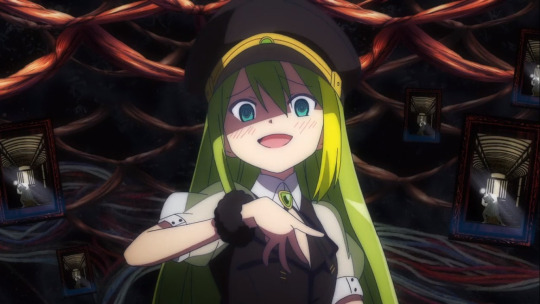
Well then, Alina Gray sure is a piece of work. The problematic fav of the MagiReco fandom, fondly referred to as psycho artist or JoJo reference. But Alina is more than a reference and more than just a psycho. In fact, is she even a psycho? In that case, psycho meaning either psychotic or psychopath (or I guess here psycho as in crazy murderous bitch). So let’s have a meaningful analysis of this character and undercover what might be a tragic tale of objectification.
We are introduced to Alina in the game in chapter 5 and in the anime in episode 9. In both media she arrives to stop the protagonists from destroying Ai, an uwasa. In the game, Madoka and Homura (Moemura) were there but not in the anime version. In the game, in her first appearance Alina appeared at first as serious, cold and irritable, before she revealed her mad and sadistic antics. In the anime, she showed up laughing maniacally, acting all eccentric and borderline insane, even strangling herself. It seems that the anime went overboard with the Alina acting crazy part. Not that I disliked it, but given that the game is the original source, I’ll keep this analysis mainly game-only.
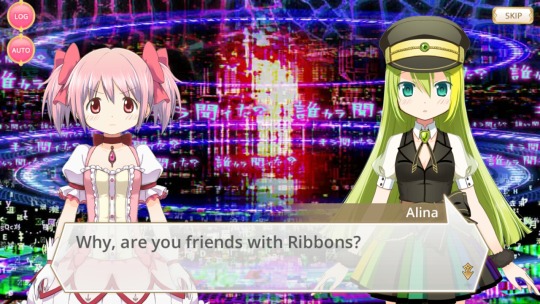
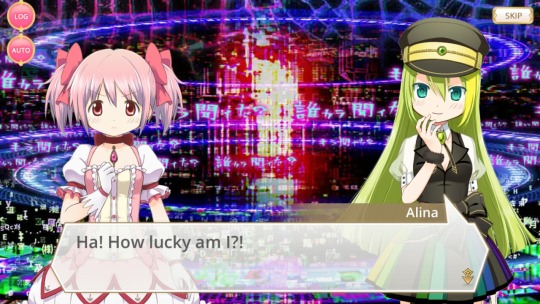
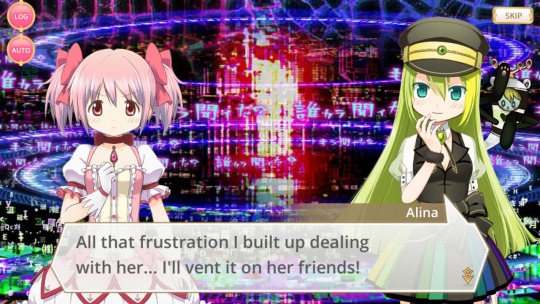
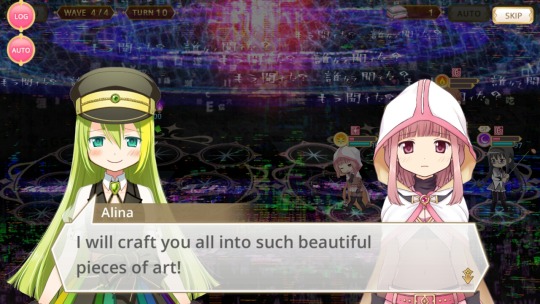
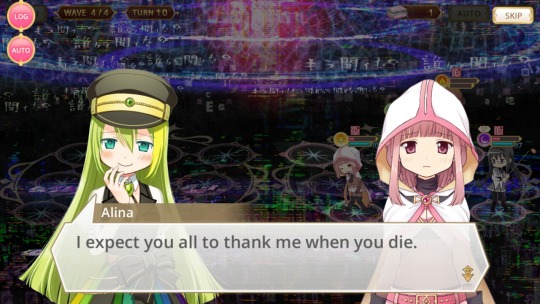
We should start by the beginning, which is Alina’s backstory as shown in her magical girl story. It’s implied that Alina’s fascination with life and death in her art started when her grandparents and dog died when she was a child. Given that this event was what drove Alina’s art, I’d say their death must have left a pretty big impact on her (especially since she was 8 years old and might not have been fully able to grasp the concept of death). Alina mentioned how her parents often got mad at her for spending too much time painting, which led her to make her wish to have a space when she can be alone and nobody can disturb her there. Alina was treated as an artist genius from a young age and gathered a lot of attention and big expectations and ended up having no privacy and being used for her talents by people around her, including her parents and teachers. Alina wasn’t valued as a person but only for her art and adults didn’t respect her privacy or free-will as they often shared personal information about her to the public or submit her arts without her authorization.
Despite being a famous artist, Alina shows no interest in popularity, admiration or love from people and simply wants to create more art. She doesn’t seem to enjoy attention or even the company of others and prefer to be left alone. No ones seem interested in how she feels, only in her art and how they can use it for their own benefit (like her teacher who submitted her art against her will and tried to force her to participate in other contests for the sake of the school’s reputation), and when she refuses she’s been called selfish. The only person who genuinely cares for Alina as a person is her kouhai Karin, but I’ll get back to their relationship later.
Her magical girl story shows Alina as someone pretty antisocial with mood swings and impulsivity issues where she can snap and result in material destruction. She seems relatively unhappy with her life and on the verge of depression. The breaking point was when she refused an award for a contest she didn’t agree to participate in in the first place, she received a letter from one of the judges: “It seems you are capable of creating a work that is so beautiful and arcane that viewers will think about it until their deaths. However, your work, which has no external theme, is a powerful drug that might drive people insane. That's why I want to tell you this. If you don't want to change the world, stop creating. You are only fifteen years old; if you haven't realized this, your brilliance will probably run out.”
I just want to mention first that the English translation doesn’t mention she’s 15 years old at that time (she’s 16 in the main story). At first, this letter may seem insignificant and harmless, until you realize how fucked up it is for an adult to say that to a teen. This judge said that Alina’s art is hollow and hurt people and that if she doesn’t intend to change the world with it, she should stop creating, and that her light will burn out. It basically implied that Alina creating art for herself is wrong and harmful and that if she isn’t creating for others, then her art is just worthless and so is her life. Again, implying Alina is a selfish person who is basically useless because she doesn’t want to meet people’s expectations and shaming her for that. Can we talk about how inappropriate, irresponsible and cruel it is for an adult to say that to a child? To crush their passion and treat its worth only by how others appreciate it? And the fact Alina was already feeling depressive before sure didn’t help.
Some people might think Alina is selfish, but let me tell you this: Alina doesn’t owe the world anything. Her art is hers and only hers, yet people kept trying to appropriate her art for their own goal, with no concern for how Alina felt, her desires, and basically treated her as a tool and used her. Now remembers, Alina started to show interest in art at 8 and in her magical story she was 15, meaning she went through 7 years of being used, guilt-tripped, having her privacy violated and having no free-will over her own creations. No wonder why she’s tired of people and just wants to be left alone, and is overall hostile to others.
After she received this letter, Alina became full of doubt and questioned the meaning of her art and life as well as her own worth, and came to the conclusion that just like her art, she’s worthless and is basically a poison and toxic to everyone. After leaving on a vacation to find some inspiration and a meaning to her art, in vain, Alina then decided that she would be better off ending all her art, as well as herself. She went on a rampage to destroy all her art before planning to commit suicide by jumping from a rooftop. She wanted her death to be her final work, concluding her art of life and death, so people can witness her last moment before her light fade away (she put a camera to record her suicide). A last desperate attempt to give some meaning to her life through death.
Kyubey did try to convince her to make a wish, twice, and the second time, Alina agreed, and wished for a space where she cannot be bothered by others. But she had no intent to play her role as a magical girl, she just wanted to add her wish in her life so it can be lost as well in her death.

Of course, as a magical girl, Alina survived the fall and encountered a witch, and, amazed by its beauty, found what the theme of her art was, what she wanted to convert to the world: Alina’s Beauty. She found a reason to live through that and a meaning to her art. She wants people to witness what she considers to be beautiful. And this is how she started to breed witches together and create even more powerful witches (again, let’s talk about that later). Interesting thing, Alina’s doppel is highly based on virus and poison that can drive people insane, which is a clear reference to her thinking her art is poison that drive people insane because of the judge.
So, what I got from her backstory is a subtle tragedy. Alina was basically objectified in a way since she’s a child, used for her talent and treated as a mere tool. Almost no one has any consideration for her feelings, desires and privacy and is, yeah, treated more like an object than a human, and put an insane amount of pressure by all the expectation and guilt-tripping people kept putting on her shoulders. Alina ended up with a disturbed sense of her own identity and what was the purpose of her life, splitting tendencies (incapacity how seeing both positive and negative, lack of nuance), impulsivity and recklessness, unstable and chaotic relationships, self-damaging behaviors, detachment from reality, as well as depression, anger and rage.
I might have sounded really precise here, right? Well, those descriptors I used for Alina are almost all the criteria for a specific disorder: Borderline Personality Disorder (BPD).
Yep, I’m basically saying that I think Alina might suffer from BPD. At first I thought she might be bipolar because of her mood swing between depression and almost manic behaviors, but bipolarity is mainly genetic and the mood switch is usually not that fast, unlike BPD. BPD is also a personality disorder, it’s not genetic and is caused by the environment, which makes more sense for Alina.
People with BPD also tend to be extremely sensitive to any form of criticism and alternating between idealization and devalorization and emotionally unstable and erratic. That sounds pretty much like what happened to Alina in her magical girl story if you think about it. BPD can also lead to psychotic episodes in more serious cases.
Now, I wouldn’t say that Alina perfectly fit the diagnosis or that it was the creator’s intention, but I feel like she’s a pretty good example of someone who suffers from untreated BPD and to me, it helps me understand the character on a more psychological basis and empathize with her.
There’s also more input on Alina’s psyche in the Holy Alina magical girl story. Again, after one critic that might look trivial from Karin (implying that Alina’s work isn’t art but breeding), Alina became overwhelmed with doubt regarding her art and extremely moody. Having her art compared to breeding and raising a pet deeply upset Alina, who’s forced to admit it’s true. She is indeed breeding witches, and she came to doubt that it’s real art.
Alina feels conflicted feelings. She’s mad that her art may not be art, but at the same time, feels excited at the idea of breeding witches, which only frustrated her even more. Surprisigly, it’s Karin who managed to make her feel better by making her read her favorite manga, bing worried that Alina might attempt suicide again. Alina understood through the manga that even if the plot is redundant, there’s a recurring theme that draws people to it. As a thanks, Alina bought a strawberry milk to Karin (while she usually stole it from her whenever she’s disappointed by her). Alina knows her art is more than just breeding and that she just need to find the core of her theme beyond life and death.
Alina decides to seek advice from her fellow Magius, Touka and Nemu. Nemu did notice how irritable Alina was these days. They make Alina realize that people tend to share a collective unconsciousness, like different civilizations worshipping the sun even though they had no contact with one another. So Alina needs to find something all humanity shares collectively, something she also shares with them. Touka suggested destruction: a death drive, a self-destructive urge. So the core of Alina’s art would be a craving towards death. After reading more about it, Alina became obsessed with the idea of self-destruction and, unable to fully grasp it, threw a tantrum and destroyed her atelier and aggressively asked Touka and Nemu for more explanation. Both explain how humans is one of the only species who kill one another even if it’s unnecessary, especially through wars. Mifuyu then arrives and complained that by destroying stuff, Alina is damaging the environment. This comment brought Touka and Nemu to find the perfect example of humans’ self-destruction: them destroying the environment. Not only are humans killing one another, they are also destroying their own planet.
Alina concluded that humans unconsciously crave death and destruction, leading them to their own destruction. She thinks this is why everyone is so fascinated by her art, because humans do seek their own death. Alina decides that she’ll indeed change the world with her art and that the core of her theme is “changing the world for the good of humanity”. Even if it sounds good, there’s something sinister behind this. For her, the “good of humanity” is granting what she thinks humans want: Their own destruction.
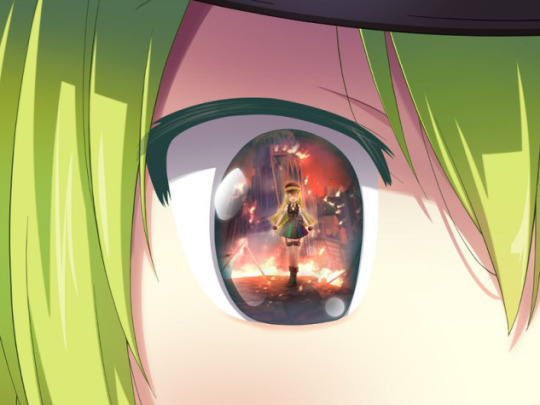
This is how she decided to become Holy Alina by wearing an Uwasa supposed to grant people their desires. And this is how Alina came to the conclusion she has to cause destruction, for the “sake” of humanity.

We might think that Alina’s actions actually came from a misguided good intention, but let’s not forget Alina is far from being a good person. She enjoys making people suffer and causing misery all around her, she doesn’t show any empathy for others and is remorseless. She’s sadistic, cruel and callous. And that lead to another diagnosis:
Antisocial Personality Disorder (ASPD).
In case you don’t know, ASPD is often referred to as sociopathy or psychopathy, even if both are technically incorrect, but let’s not dwell on that. Alina does exhibit a lot of antisocial behaviors, even before she became a magical girl, such as: Failure to obey laws and norms by engaging in behavior which results in criminal arrest, or would warrant criminal arrest, impulsive behaviors, irritability and aggression, disregard for her own safety and irresponsibility. She laters shows a blatant lack of remorse for her actions and a lack of empathy. The only traits she doesn’t seem to have is lying, deceiving and manipulating for her own profit or amusement. Alina is someone who is brutally honest and has no issue with speaking her mind and herself said that she doesn’t lie. I don’t recall any incident where Alina lies, but she can be deceiving and manipulative, like when she purposefully misled Madoka and Homura about Mami’s fate to hurt them, making it look like Mami met a gruesome death simply to make them suffer. But, ASPD can only be diagnosed when you’re 18 and alas, Alina is 16. But, there exists a precursor to ASPD for kids and teens, which is required to be diagnosed with ASPD: Conduct Disorder.
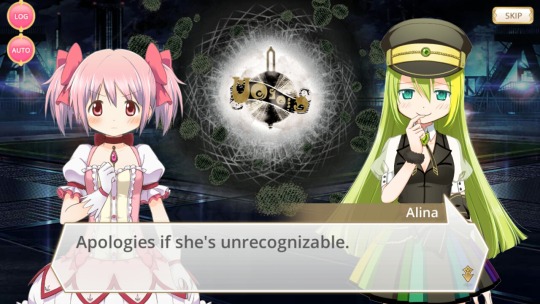
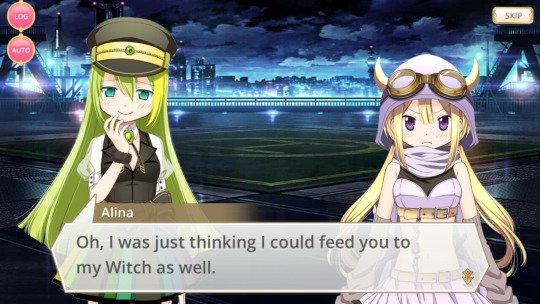
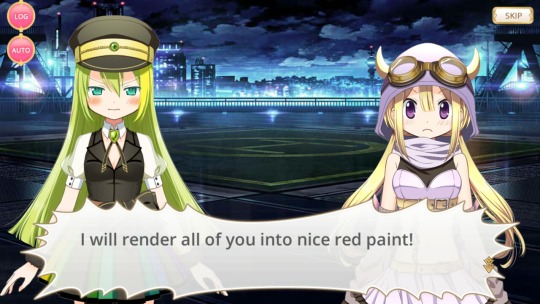
Alina almost fit the textbook criteria of conduct disorder. She’s a bully, aggressive, cruel towards others (and potentially animals), vandalism, deceptiveness and serious rules violation. And most of those were even before she became a magical girl. She often mistreats Karin and shows no respect for authority, she’s cruel towards others and I feel like it’s implied that Alina might have killed animals (and there’s also her reaction to Kyubey, who she thought was an animal and ended up kicking) and causes a lot of vandalism. Those were rather mild thoughts before she became a magical girl, where she’s downright dangerous and craving destruction.
BPD and ASPD both belong to the same cluster of personality disorder, cluster b, and are often comorbid. ASPD is often referred to as sociopathy, and given her borderline behaviors, Alina is pretty low-functioning. She’s impulsive, erratic and doesn’t bother to hide her true nature.
So, am I saying Alina is an irredeemable evil person who only seeks death and destruction? Yes, but no. There’s more to her. I won’t deny Alina’s cruelty and sadism and lack of concern for others well-being. After all, she doesn’t shy away from tormenting people, torture and attempted murder. But Alina isn’t born that way, she was driven to become a monster by the people around her. Alina wasn’t allowed to be a human, her feelings, desires and freedom were always disregarded, everything that makes someone human. Instead, she was treated like an object, an an object doesn’t have feelings and only serves a purpose. And the big tragedy in that is that Alina herself ended up objectifying herself. She decided to accomplish what she thinks humanity wants by causing destruction, but she’s also projecting her own self-destruction craving unto humanity as a whole. In the end, she tried to become the tool who will change the world for the good of humanity.
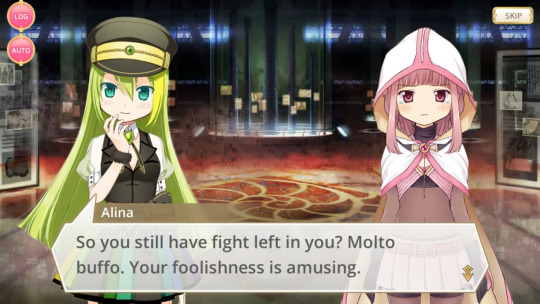
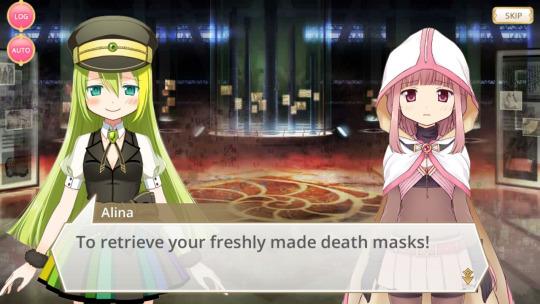
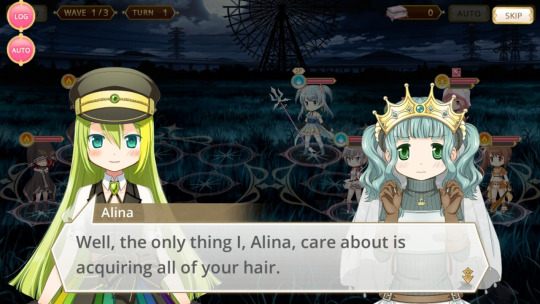
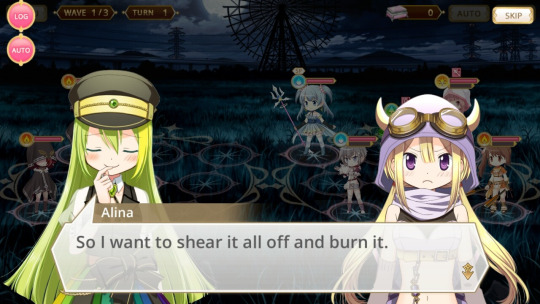
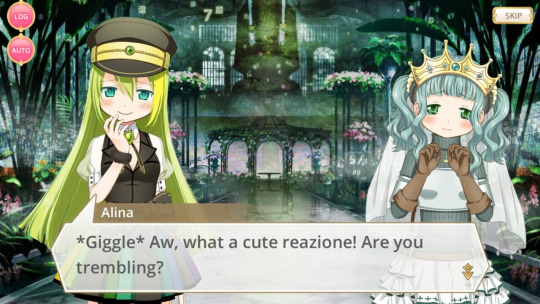
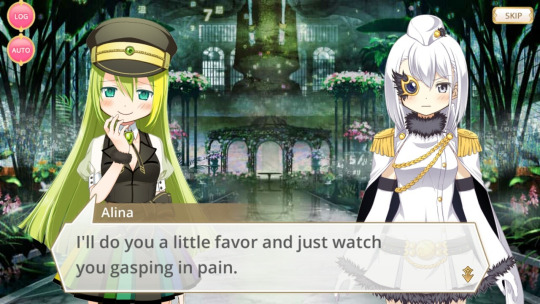
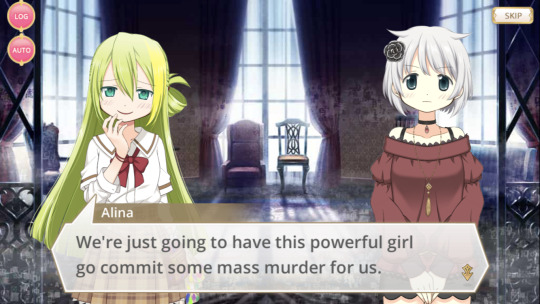
Being treated like an object made Alina unable to relate to others or understand their feelings, treating others just like she was treated: as objects. Alina seems to care for Mifuyu, but not as a person. Alina only values Mifuyu for her body, which she considers to be a work of art. Let’s not forget that magical girls’ true bodies are their soul gems and their human’s body is pretty much an empty shell, so Alina only caring for Mifuyu’s human body and not her as a person does show that she views Mifuyu as an object, not a person.
She also doesn’t understand humans’ bonds. When she proposed to spare their lives in exchange for Felicia (who she was angry at for destroying her witch), she didn’t understand why Tsuruno was so upset. Tsuruno even said “people aren’t objects!” which confused Alina even more. For Alina, everyone, including herself, are objects, and she herself can’t understand why others value people’s lives.
There’s also the way she’s treating witches. At first she seems to care about the witches she raised, considering like like pets and art and throwing a tantrum when Felicia destroyed one of them. But later in the story she shows no remorse to sacrifice the witches she raised, which shows that Alina doesn’t actually care for them, but given that they are hers, she can’t bear people other than her destroying them (or destroying them against her will). Alina did say that only an artist can destroy their own art. Given that she views the witches she raised and breed as her art, she doesn’t actually view them as actual pets but again, as objects. Alina’s objectification extend to witches too.
In one of the Christmas Events where she turned into Holy Alina, she ended up causing a lot of good actions while trying to do bad actions, which made people love her. But it didn’t please Alina at all. She doesn’t care about being loved or hated, she doesn’t care about what people think of her, good or bad actions. At some point, she noticed someone about to blow off a bomb and didn’t care nor show any interest in stopping him until she realized the bomb could damage Mifuyu’s body (again, she wasn’t worried for Mifuyu’s well-being, just her body). Alina seems to not feel shame for her behaviors, neither find it rewarding to be loved and praised.

Another thing regarding Mifuyu. At some point, the Magius (so Alina too) decided to sacrifice Mifuyu and feed her soul gem to Eve. I found it strange that Alina seemed to agree, until I realized something: A magical true body is their soul gem and they only need to feed that to Eve. There’s no need to feed Eve with their empty shell of an organic body. So I came to the conclusion that Alina didn’t mind sacrificing Mifuyu’s soul gem as long as she can keep her body. It just shows how much Alina doesn’t care about Mifuyu as a person and only valued her as a piece of art. An object. (And God knows what she would have done with her corpse).
Well, I’m not making a case about Alina not being an unredeemable piece of shit huh? Well, I decided to keep the best for the end: Her relationship with Karin.
It’s undeniable that Karin holds a special place in Alina’s heart (or whatever Alina has instead of a heart). Alina is cruel and mean towards Karin, true, but unlike other people, Alina never hurts Karin for her own pleasure or by sadism. Most of the time, she ended up mistreating Karin out of anger, mostly when she deemed that Karin made her lose her time or disappointed her, or when Karin is being dishonest with herself and doesn’t improve. Alina insults her and belittles her, as well as stealing her strawberry milk, not with the intention of hurting her, but as a form of punishment. Like a parent disciplining their child. But Alina does sincerely want Karin to improve and the fact that she takes the time to teach her, spend time with her and even rewards her proves that, in a way, Alina does care about Karin. In a really shitty and abusive way. But I don’t recall any instances where Alina physically harm Karin or show to enjoy hurting her. Still shitty and abusive, don’t get me wrong. But I feel like Alina is being abusive towards Karin because she’s unconsciously repeating how her parents may have treated her as a child. We know her parents often got angry at her and perhaps they acted in a way that is similar to how Alina treats Karin. The cycle of abuse sure is a tragic thing.
But why Karin? Well, I got a couple of theories. First, Karin is the only one who seems to care about Alina as a person and not an object. Karin greatly values Alina and is concerned about her feelings, something Alina isn’t used to, being only values for her talents. Karin often notices Alina’s change of mood and shows rejoice whenever Alina is in a good mood. She also worries greatly about Alina when she’s in a bad mood and even fear that she might try to commit suicide again. Karin is also someone who respects art and thrives to improve even if she seems to lack the talent. But she is still optimistic and never gives up, and she knows why she’s doing art. She wants to make people happy with her stories. Almost the opposite of Alina, who’s rather pessimistic, she oftens despaired regarding her art, she has the talent but lacks substance and doesn’t exactly know why she does art. Alina even admitted that Karin might be a bigger genius than her because of her passion, which Alina feels like she lacks, feeling empty inside. Even if Karin has expectations towards Alina, it doesn’t seem to put pressure on Alina, as Karin shows interest in how to make her own art and not Alina’s art itself. In a way, perhaps Alina can relate to Karin in a certain way, with her desire to make art, as well as being envious of how Karin can just be carefree about her art and be able to enjoy it without having people trying to use her. Perhaps this is why Alina is able to care about her, because in a way, she can relate to Karin. Still, Alina is abusive towards Karin and her intention doesn’t change how poorly she treats Karin.
Funny thing, Alina herself doesn’t seem to know exactly why she makes art, and ends up needing others' opinions to figure it out. She ended up deducing that her core theme is self-destruction because of Touka and Nemu, which seems to make sense with Alina’s fascination with life and death. People focus on the death aspect, but Karin thinks that Alina’s works are actually full of life. Perhaps Karin is the one who’s right, maybe Alina's actual core is more towards life, but given how twisted Alina became, she doesn’t even realize it herself. Maybe Karin is the only one who can see the good Alina might have deep down inside of her, or may even bring the good inside of her. Who knows, Karin might be the key for Alina potential redemption.
Also, it may not look like it, but I think Alina is constantly hurting inside, due to depression, but she’s so disconnected from her own feelings that she doesn’t realize it and unconsciously hurts others because she’s hurting. Alina is full of unhealthy coping. Her own fascination for life and death started by the death of her grandparents and dog when she was a kid, and might actually have traumatized her and her way to cope is her art. That would explain why Alina herself is uncertain about her theme, because often, understanding our own trauma can be quite hard, or even realize that we experience trauma in the first place. Perhaps death traumatized Alina and her art is her way to understand death better and accept it as a part of life itself. Maybe she actually wants to value life by understand death, because without death, life loses its core value.
So, did I answer the question? Is Alina a psycho crazy jojo villain? Yes, but no. Alina isn’t a psychopath and not downright psychotic either (even though she might experience psychotic episodes). Crazy? Well, I do think she suffers from personality disorders, but it doesn’t make her insane. A sociopath? Maaaybbeee. But to be honest, I mainly think Alina is someone broken who is the result of her environment, someone constantly hurting inside with deep self-destructive urges. The objectification made her feel disconnected from her feelings and humanity and turned her into a monster. But it doesn’t excuse her villainous actions, it only made them understandable and Alina more sympathetic.
Well that was longer than I expected. Let me know what you think and thanks for reading!
152 notes
·
View notes
Note
Lol I *hate* that post. Also like, most people don't read classic lit, and classic lit in general can be critized as being made up of primarily cis, white, straight men. Women and queer authors often have their works shuffled into YA. And fanfic?? Primarily made of of women and queer folk (and queer women). Which... is often what the reasoning is why it's targeted.
Also, children's lit and YA lit are some of the best works I've read. They deal with harsh topics. One of my favorite books from when I was a kid is Gossamer by Lois Lowry. My class read it in fifth grade (so like, 10 year olds) and it dealt heavily with abuse and coping with and recovery from trauma. The book Speak by Laurie Halse Anderson also deals with very dark themes, and it's YA. (Also both very good books and I highly recommend each. Look up the trigger lists for them. When I say they deal with dark subjects, I mean it.)
Fanfic and YA are such broad categories, and to dismiss them shows a clear lack of true understanding of literature. Typically, when people say they dislike them, it boils down to bias against queer people, women, and romance as a genre (which was spear headed by, you guessed it, queers and women).
Also, there's nothing wrong with liking tropes. I like tropes. Everyone likes specific tropes. We've all just been copying off of one another since the beginning of art creation, and we will continue to do so. Just let people enjoy things ffs. Reading is for fun and creating fanfic is for fun. Just because I read or write something doesn't mean I want to base a master's thesis around it
[In reference to this post: TL;DR - people who only read fan fic/YA aren’t capable of understanding/analyzing complex themes bc they’re obsessed with tropes]
Oof! @gabedemon, this is all a really good point/addition to why that OP’s point was 😬.
Now I’ll confess I do not personally like YA as a general rule, largely for two reasons: 1) I don’t like reading about teens and 2) for a while EVERYONE and their grandparents were writing YA to try and hitch onto the bandwagon of popular novels turned films like Harry Potter and The Hunger Games, et al, and so a lot of people were writing stuff just to try and ride a trend rather than bc that’s what they should have been writing/what their story actually wanted.
However, you are 100% right that there are some amazing novels that fall into that broad category and are worth reading whether you’re 15 or 95 (or somewhere in between).
One of the best novels I read before my headache began (and I stopped reading novels 😞) dealt with some really heavy issues (it was focused on suicide) — and it managed to delve into complex mental illness (like BPD, borderline personality disorder) and suicidality in a really realistic and complex way while not glorifying it in anyway. I highly recommend it, if the topic isn’t too tough for you (general you) to deal with, Suicide Watch:
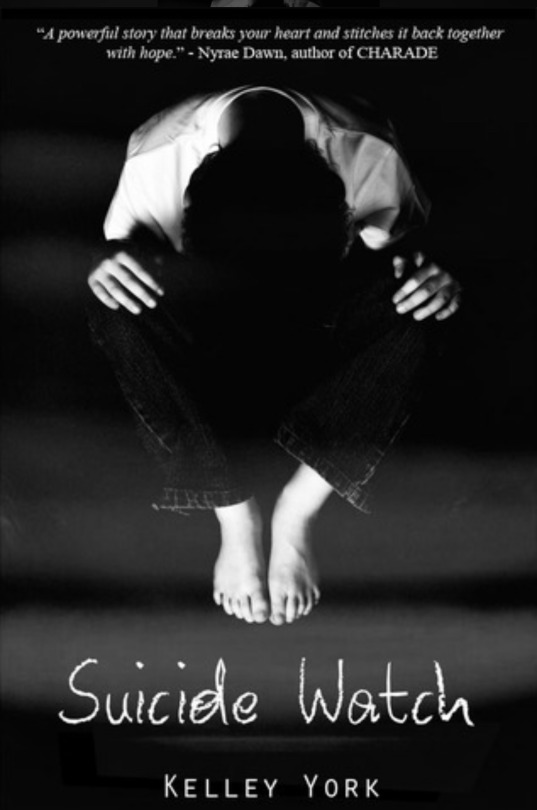
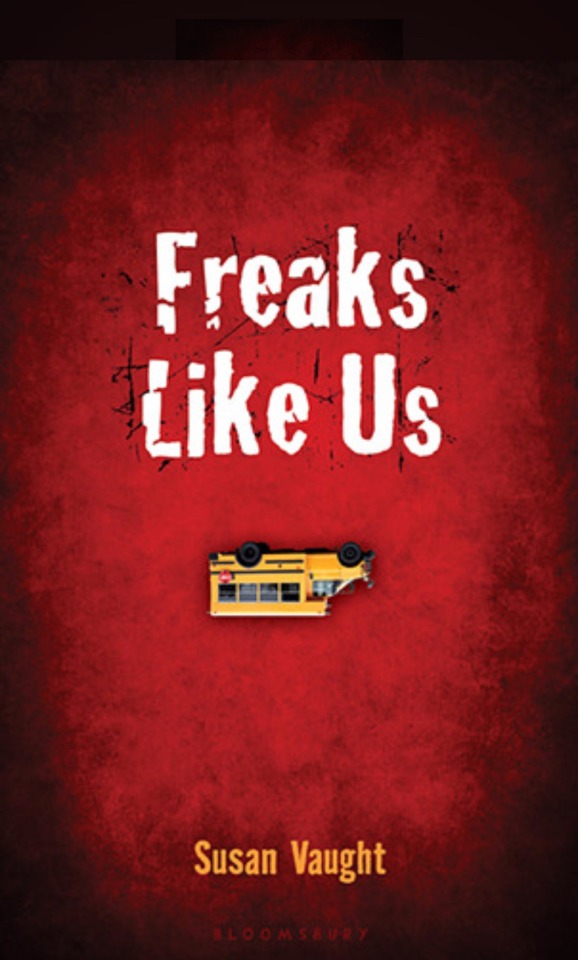
I definitely think you see queer authors and their stories forced into niche publishers or fan fic (I don’t know if I would say only YA here as I’ve read a ton of non-YA queer published fiction).
I think you have some people who are just “snobs” who think only “serious” “literary fiction” is worth reading and has any depth. Those people have probably never read a really good YA novel (I also recommend Freaks Like Us for one that tackles mental illness in a insightful way) or any fan fic at all. (Or if they have, it’s something like My Immortal.) So they make the assumption that all fan fic must be meaningless drivel (as if there isn’t plenty of that in mainstream, published adult fiction or other media for that matter).
They also forget that people read for different reasons, and like you said, not everyone wants to read something to write a master’s thesis on.
Some “pulp” stories, like the Sherlock Holmes tales, have survived and proliferated across time and languages because people find them entertaining and can identify with the characters in some way. (Ofc some people like to analyze those stories but not everyone does; in fact, most people don’t, and that’s perfectly fine.)
So I think you have the snobs who really aren’t looking at it from a “I must crush queer writers,” though ofc you’re absolutely right about the fact that bias still exists among readers and publishers.
As I mentioned before, trying to publish a novel with a queer MC or romance through one of the big ones is really difficult for the same reason we see plenty of queer baiting in film but very few actual queer stories. Publishers are afraid that those stories won’t sell, will offend and affect sales of other books, etc, etc,
So we see the proliferation of queer stories and writers in fan fic where people are free to write whatever they want. And that’s really wonderful, imo. (But I also hope we finally see more mainstream queer stories and authors/creators as well.)
And as for tropes, honestly that was the dumbest part of the whole argument. Tropes have always and will always exist bc there’s just some things we humans love to see over and over and over again. I’m sure you could label just about any “high” art with a trope of some kind. Just bc something can be distilled into tropes doesn’t mean that’s all it is. I mean, writing programs always talk about things like “the hero’s journey” or whatever and that’s a kind of trope, too.
Anyway, I’m gonna stop before I keep rambling 😅 but yeah I think you make some really great points/additions, and I absolutely think that “all generalizations are bad” 😅😂 and trying to make a sweeping assessment like that is ridiculous.
Kind of reminds me of how much scorn “genre” fiction has gotten (think mystery novels or romance novels or sci fi, etc) because it’s “shallow.” But that has begun to change, and I do think we’re slowly seeing the attitude toward fan fic changing…. Now, if only we could chuck all the antis and their puritanical BS out the door….
9 notes
·
View notes
Note
Hi Jessica! This might be too personal so if you don’t want to answer that’s perfectly fine! Anyways, given that you’ve been open about BPD I was wondering if you know of any signs/symptoms I can look out for in other people? I recently had to cut off my best friend of over 15 yrs bc her behavior has just gotten so out of control & I couldn’t handle it anymore. I had to set boundaries. Now that she’s moved out I’ve been reflecting and I think she might have BPD? Do you have any advice?
Hello :) So I’m sure you’ve already done this but the first thing to do would be to look up the symptoms: https://www.mind.org.uk/information-support/types-of-mental-health-problems/borderline-personality-disorder-bpd/about-bpd/
But symptoms and experiences can be quite different. I would say there are some things to look out for. A lot of us will act out with drugs, casual sex, self harm but it could also be a sign of bipolar etc. I would say for me the most prevalent symptom which interrupts my ability to have friendships and relationships is my anger. If your friend has BPD they might get angry easily and can seem to others to be quite vindictive. It will often feel like you’re living in a different world from that person, you don’t understand how they could get so angry about something or get angry so quickly. I’d take some time to think back to when she might have displayed a lot of anger towards you and what happened leading up to it. The big triggers for me are abandonment - so it could be that you changed your plans with them, you didn’t respond to a text, you responded with an emoji instead of an enthusiastic message, you were hanging out with other friends instead of them - and criticism. Now something may not seem like criticism to you or you may not have meant it that way but it can be perceived as such anyway. So it could simply be someone disagreeing with her. Because to her, the views that she holds are the same as her whole identity so disagreeing with her view means disagreeing with her as a person.
Being friends with someone with BPD does require changes to the way you might approach a situation. I like to think that it can be worth it, that we’re just as valuable to have as a friend as anyone else, but not everyone can deal with it and it’s better to be clear and set boundaries as you’ve done if you can’t manage. I’ve been in therapy for about a year now and the main skill we learn is mentalizing. Mentalizing is basically curiosity: about yourself, about your thoughts and feelings, about the thoughts and feelings of others Those of us with BPD tend to over or under mentalize. We are either hyper sensitive to what people might be thinking - filling in gaps with negative information, assuming they hate us, obsessively thinking about things - or we totally shut down mentalizing. That’s why we sometimes come across as lacking empathy. Everyone does it now and then but people usually sit in the middle; those of us with BPD find it a lot harder to be in the middle. My mum has been working really hard on mentalizing with me recently. I love her to pieces but in the past I’ve found it hard to talk about emotions with her because she has her own BPD traits - probably just sub clinical - and her reaction is to jump to the practical things so sometimes I feel ignored or like I’m failing to live up to what she wants me to do (like if she tells me to take a walk to help my mood and I don’t, I feel like I’ve let her down). Recently if I say that I’m upset about something she tries to ask me questions about why I’m feeling that way instead of reacting straight away. She tries to affirm my experience straight away, saying that it sounds difficult and she’s sorry that I’m going through that. She will ask if I’d like practical suggestions before she makes them. And it really has helped. It’s something that you can do and encourage your friend to do. Just be curious. If she responds in a way you don’t understand, ask her to explain instead of just assuming she’s hysterical or irrational. To her there is probably a very logical explanation for her reaction, you just don’t get it. Don’t assume she knows your thoughts and feelings on something, be vocal about them. Communication is really really important. Good luck!! I’m here if you need anything :)
3 notes
·
View notes
Note
if you could rewrite skam italia season 2 to more accurately represent bpd and its symptoms, what would you change?
The short answer is I wouldn’t really change anything. But the reasons for that require explanation, so buckle in, this is going to be a long one.
I think accuracy is a subjective term when applied to portrayals of mental illness. Because people have very varied experiences. So what would be an accurate portrayal of BPD for me might not necessarily be accurate for someone else. Since the revelation of Nico’s diagnosis and my various posts on the subject, I have had messages from numerous other borderlines. A lot of them – like myself – related to Nico in many aspects. But there are also some who didn’t – or who did in some aspects but not others. The fact of the matter is that it’s not possible to portray a disorder like BPD in a way that is wholly accurate and relatable to everyone in all aspects because people have such varied experiences. If you’re interested in another portrayal of BPD, I recommend watching Crazy Ex-Girlfriend. For me, some aspects are incredibly relatable – sometimes uncomfortably so – but others are not. But that doesn’t mean those aspects are inaccurate. Another portrayal of BPD is the film Girl, Interrupted (one of my absolute favourite films) – however, some people with BPD (myself included) relate less to Winona Ryder’s character, who is the character diagnosed with BPD, and much more to Angelina Jolie’s character. Like I said, it’s subjective.
It’s also important to note that though there are nine diagnostic criteria for Borderline Personality Disorder only five are required for diagnosis. So one person could have almost completely different experiences to another. And even if you do meet all of the same criteria as someone else with BPD your symptoms may manifest in different ways. For this reason people’s experiences with BPD can be incredibly varied. I meet all nine of the diagnostic criteria (it’s like winning a really shit lottery) – so I have experience dealing with all of them, but how I experience them may be very different to the way someone else experiences them. As an example: people deal with fear of abandonment in different ways. Some people self-isolate as a way to avoid abandonment. Some people may appear “clingy” e.g. they will send constant texts and make frequent phonecalls. Some people experience what we call “splitting”. Some people experience all three. Basically, we all have our own individual experiences and there’s no one way to be borderline. Symptoms can manifest in so many different ways.
I’m putting this under a read more to save everyone’s dashboards because it’s quite lengthy. But if it interests you, I’ve listed the DSM-5 diagnostic criteria for BPD and how Nico’s symptoms accurately fit into that.
The nine diagnostic criteria for BPD are quite broad and are as follows:
Frantic efforts to avoid real and imagined abandonment.
A pattern of unstable and intense interpersonal relationships, often characterised by extremes between idealisation and devaluation (also known as “splitting”).
Identity disturbance: Persistently unstable self-image or sense of self.
Impulsive behaviour that is reckless and potentially self-damaging (e.g. overspending, excessive alcohol or drug use, reckless driving, unsafe sex, binge eating, spontaneous decision-making, the list goes on).
Recurrent suicidal behaviour or ideation and/or self-harm.
Emotional instability (intense mood swings) e.g. intense episodic dysphoria, euphoria, irritability, or anxiety that can last from hours to days
Chronic feelings of emptiness and loneliness
Intense anger or difficulty controlling anger
Stress-related paranoia or severe dissociative symptoms (feeling disconnected from the world, or your own body, feelings, thoughts and behaviours)
It’s difficult to know how many of the criteria Nico meets as we have very limited background information to go on. After all, this is Martino’s season. Everything we see of Nico is in relation to Martino. Which makes it even more difficult to portray something like BPD. We have no inside knowledge of Nico’s thought processes, his past behaviours or what led to his diagnosis (hey, Ludo, can we uhhhhh get a Nico season please?). But he has to meet at least five of the above criteria to have been diagnosed. From what we have seen, the five he definitely meets are:
Frantic efforts to avoid real or imagined abandonment (the back-and-forth with Marti, ignoring his texts then telling him he wants to be with him, freezing Marti out after his ill-advised comment on mental illness, going back to Maddi, the flipbook and the antidote, suggesting that he leave and his refusal to let Marti look at him when he was in a depressive state).
Impulsive/reckless behaviour (breaking into the pool at Halloween. Taking his mum’s car and driving to Bracciano. Milan in general.)
Emotional instability (I don’t think I need to give you specific instances here because his emotional instability becomes quite evident in general).
Chronic feelings of emptiness and loneliness (his speech about solitude in Nel Mio Letto explains this feeling perfectly).
Stress-related paranoia or severe dissociative symptoms (Milan, again).
He also shows clear signs of:
A pattern of unstable and intense interpersonal relationships (his parents, Maddalena, probably his friends/the boy he liked from his previous school. But we have limited information on his interpersonal relationships outside of Marti – though that’s unstable for most of the season thus is a sign in itself – so whether there is a distinct pattern of unstable relationships is unclear at this point, but it’s very likely given what information we do have. Whether he experiences splitting or not is unclear, too).
Identity disturbance (when he asks Marti if he should get a haircut and a tux to meet his dad, when he proposes à la Love Actually, when he’s staring at his reflection in the hotel room window, when he’s rapping Earl Sweatshirt and boxing in the bathroom – these could all be signs of an unstable identity, but I wouldn’t categorically define him as having persistent identity disturbance since we don’t know if it is in fact a persistent symptom).
So, Nico meets at least five but very likely seven out of the nine diagnostic criteria. The only two he hasn’t shown any signs of are:
Recurrent suicidal behaviour or ideation and/or self-harm.
Intense anger or difficulty controlling anger
So, to reiterate, accuracy is subjective. Nico’s symptoms were incredibly relatable for me personally. They’re just not the only symptoms and not the only way symptoms can manifest. Like I said, I experience all nine of the diagnostic criteria. So it wasn’t even a 100% accurate portrayal for me because I experience other symptoms too (splitting, anger/rage, suicidal behaviour and self-harm, among others). But I did relate a hell of a lot to the symptoms Nico did experience and the way he experienced them. I’m also incredibly grateful they didn’t focus on the suicidal aspect because there’s a lot of stigma surrounding BPD in regards to suicidal behaviour being manipulative, and if not handled well it might have been counterproductive. It was so important to me to have such a hopeful portrayal for that reason, because we are often portrayed in a terrible light.
I think the main thing that confused people regarding accuracy was Nico’s episode in Milan. Because it looked similar to Even’s manic episode in the OG. Which I understand. But it wasn’t the same thing. Many people with BPD, myself included, experience psychotic symptoms. Psychotic symptoms such as severe paranoia, hallucinations, depersonalisation, derealisation or distortion of beliefs and perceptions aren’t uncommon (there are a bunch of studies on this if you’re really interested, because health professionals are still trying to determine the cause and frequency of psychotic symptoms in BPD patients). They’re generally triggered by stress. I’ve experienced brief episodes of psychosis on and off for years. This is what Nico experienced in Milan (triggered by the stress of his parents and Maddalena trying to control him) – Nico truly believed that he and Marti were the last two people on Earth. To me, his episode looked like severe dissociation leading into brief psychosis – or psychotic symptoms, if you will (episodes of psychosis in BPD tend to be brief). So while I understand that it was confusing, it was, in fact, a fairly accurate portrayal of psychotic symptoms in BPD. I had a far more severe reaction to Nico’s episode than I did to Even’s because I saw so much of myself in him. Would it have been helpful to portray Nico’s psychotic symptoms in a way that wasn’t so similar to Even’s manic episode? Absolutely. But the fact remains that it was accurate and it made sense in the context of the season and the metaphor that Nico got caught up in of him and Marti being the last men on earth. It wasn’t random, it was cleverly interwoven.
Sorry for how long this got, but I felt like to answer this question required some explanation. To summarise, I actually don’t think I would change anything. There’s a reason I relate so much to Niccolò. But I don’t contest that others with BPD might not have found it as accurate a representation as I and others do. That’s absolutely their right. Because symptoms are incredibly varied and we all have our own individual experiences.
89 notes
·
View notes
Text
Raised by a Borderline
I need to take a brief hiatus from public updates for BTBW. Patreon early access updates and other content will still continue. I just need to prioritize my work load and take some time to recover.
I normally don’t like to involve my personal problems with social media or work, but I feel like this is something that has to be said.
My mother recently made a disingenuous suicide attempt as a means to manipulate me.
I grew up with a mother that has borderline personality disorder. If you don’t know what this is, this article gives helpful information.
People who have BPD often suffer from absolutely delusional and batshit obsessive levels of insecurity, and will do anything in their power to prevent people from leaving them. In my case, my mother had been visiting another city when I informed her that I would be moving out for my own health and well-being. She waited until around the time I said I would be back to grab my things to stage a suicide attempt. I say staged, because she very strategically timed this. I came home to grab some of my things and found her passed out with a suicide note on her phone. I called 911 and the police searched her room to try and figure out what pills she might have taken. I even went outside to help them look in the grassy area around her window.
Turns out, she left the fucking pill bottles ON MY BED in MY ROOM. She clearly intended me to be the one to discover this scene. Later at the hospital, I found out that there were a lot of pills left in the container, meaning that she didn’t even take that many. This entire situation was very obviously a charade to guilt me out of my decision to move away for my own sanity.
I have been emotionally abused and gaslighted by her my entire life and I needed to remove myself. Rather than simply accept that I am an independent adult that needs to move away for my own development and well-being, she always pulls absurd shit any time I try to distance myself.
Last time I tried to leave, she pulled a knife on me.
Why? According to her, because I had the only key to the outer door for the apartment complex, she couldn’t go out to smoke if I was gone.
If you’re interested, I explain more details about my background and childhood in the rest of this post. If not, now you know why updates have been somewhat inconsistent as of late.
Throughout my entire childhood, my mother threatened me with abandonment and was physically abusive.
She would say and do awful things any time she felt “insecure” or “worried.” Of course, these feelings could be triggered by anything from me losing my jacket at school or simply saying something that hurt her feelings. In addition to threatening to send me to a foster home, she would also insult me and say absolutely awful things like, “you’re useless just like your father,” or “I wish I never had you.” She tried to justify this sort of behavior by claiming that she was just worried I would develop the same bad habits as my father and she wanted to “set me right.” My parents were divorced when I was four years old, and my mother has always talked shit about my father and then used that as a justification for why she was so malicious toward my innocent childhood flaws.
My mother was always financially very clever, and she would always use financial support as a means to control me. I was always well-provided for financially, and I used to think that meant everything was okay and that she was a good mother. I didn’t realize that every she has ever done for me was a trap to ensure I could not later leave. She would offer support so she could later use it as leverage to control or manipulate me. I cannot count the number of times she has threatened to throw me out after asking me to live at home.
When my mother became upset, she would wildly flail and strike me as a child. I remember one occasion where she attempted to strangle me and had to be pulled off by my grandmother. On another occasion, to prove to other parents that she “knew how to discipline her child,” she struck me with a ring on and gave me a bloody nose. (We happened to be in the company of other people who regularly struck their children, so I suppose this is why no one called the cops). As I got older, I actually became less afraid of being hit, and more afraid that she would accidentally hurt herself during her erratic, uncontrolled thrashing. Eventually, I think she stopped physically assaulting me because I made it very clear I would knock her teeth out if she tried. I am quite strong generally, and one time I simply held her down while she screamed and was trying to reach the scissors so she could vandalize my property.
She gaslighted me and pushed me away from my passions.
I neglected my art for years because I felt like I had to pursue a certain career or lifestyle in order to be accepted. I suffered from severe depression and suicidal tendencies for most of my life because I constantly felt like I was not good enough. She had subtle ways of manipulating me away from truly pursuing what I wanted, even if she did not outright forbid me from drawing. It was a complicated and ongoing manipulation that left me feeling like my self worth was entirely derived from my social status and financial success. Any time I would try and address this, she would deny ever mistreating me or doing anything to make me feel unworthy.
I honestly did not realize something was wrong for the majority of my life. My mother gaslit me and convinced me that she was a perfect parent for most of my life. There are hazy gaps in my memory where I can’t remember exactly what was said or done. I just remember a few vivid instances of abuse occurring.
Typically, I am incredibly good at spotting borderlines and culling them from my social circle. I’ve an acute sense of spotting bullshit and warning my friends about it. However, I guess it’s a lot more difficult when it’s a situation I was raised in.
She eternally self-victimizes and refuses to behave like an independent adult.
My mother, in spite of being a capable and competent person, feels entitled to being pandered to. My whole life, I felt like I had to constantly tip-toe around my mother and try and meet her endless need for emotional validation. She expects to constantly do things for her in order to “prove that I care,” even things that she is perfectly capable of doing herself. Any time a conflict occurs, she is incapable of showing any accountability for her own actions and inevitably always blames others for hurting her or not being kind to her. Just recently, she started berating me for not caring about her because I offered to set up an Uber account for her so I she wouldn’t be reliant on me calling one for her every time she needed one. She basically felt like I should be happy to call Uber for her, even though it would be more convenient for her to have her own account. Her entire reasoning for refusing to get an account was an irrational fear of credit card fraud, based on some unrelated incident that happened to a friend of hers. Therefore, according to her reasoning, others should simply pander to her illogical behaviors that are based on totally unfounded insecurities.
87 notes
·
View notes
Text
Borderline Personality Disorder (BPD) under the Alternative Model
The following is based on the DSM-5’s alternative model for personality disorders in general and Cluster B personality disorders in particular, which I have discussed in previous posts.
—
BPD is the Cluster B personality disorder that is largely distinguished by Negative Emotionality, while also involving either Disinhibition or Antagonism, in which personality dysfunction—along with the destructive patterns that characterise Cluster B more generally—are centred around impoverished self-image and goal-setting, intolerance of stress, emotional volatility, preoccupation with negative evaluation and rejection, and interpersonal interactions that are intense, inconsistent, and toxic.
—
Although the antagonistic traits Manipulativeness and Deceitfulness are not diagnostic with respect to BPD, they do frequently co-occur with it. When such traits co-occur with BPD, the relevant instances of manipulation and deceit tend to constitute desperate attempts to avoid or prevent perceived negative evaluation, rejection, or abandonment (by abusing the person who is expected to impose such a thing). Even when instances of manipulativeness and deceitfulness are insufficiently regular to imply the corresponding pathological traits, the nature of BPD is such that manipulation and deceit are highly likely to occur whenever there is sufficient stress relating to negative evaluation, rejection, or abandonment, and they seem to be the most effective means of prevention.
—
Moreover, while proneness to delusional thinking is not strictly required by BPD, it also frequently co-occurs with it (indeed, the name for the disorder originally comes from the idea that it sits on the borderline between neurosis and psychosis). Accordingly, there is a noteworthy subtype of BPD—Borderline Personality Disorder with Psychotic Features—which amounts to the co-occurrence of BPD with a specific proneness to delusion (in which the psychosis is typically both paranoid and stress-induced), as reflected by either of the following Psychotic traits:
Unusual Beliefs and Experiences (Psychoticism)
Cognitive/Perceptual Dysregulation (Psychoticism)
—
1| The Parts of BPD
Both of the following are present at least by early adulthood:
—
1. Moderate or greater personality dysfunction, manifested by at least two of the following:
Impoverished Identity (Identity)
Goal Instability (Self-direction)
Devaluative Hypersensitivity (Empathy)
Push-Pull Conflictiveness (Intimacy)
2. From among the following seven pathological traits—which are aspects of Negative Emotionality, Disinhibition, and Antagonism—one aspect of either Disinhibition or Antagonism* together with at least three other traits (summing to a total of at least four traits:
Emotional Lability (Negative Emotionality)
Anxiousness (Negative Emotionality)
Separation Insecurity (Negative Emotionality)
Depressivity (Negative Emotionality)
Impulsivity (Disinhibition)*
Risk-taking (Disinhibition)*
Hostility (Antagonism)*
—
2| Personality Dysfunction in BPD
Every instance of a personality disorder involves characteristic difficulties in at least two domains from among Identity, Self-direction, Empathy, and Intimacy. In this section, I shall briefly explain each of the specific difficulties that are characteristic of Borderline Personality Disorder. To this end, BPD specifically requires at least two of the following characteristic difficulties:
—
(Identity) Impoverished Identity: Markedly impoverished, poorly developed, or unstable self-image, often associated with excessive self-criticism; chronic feelings of emptiness; dissociative states under stress.
“I don’t have a good grasp of who I am, either because it’s never clear to me or because it’s constantly changing. It gets a lot worse when I feel overwhelmed or stressed out. At those times, I can lose sight of what I’m like, what I want, and what I believe—or these core aspects of myself can suddenly seem to change in drastic ways. I’m convinced that I’m worthless. I always feel as though something’s missing inside me.”
(Self-direction) Goal Instability: Inconsistency or paucity in goals, aspirations, values, or career plans.
“I often have no idea about what I’m doing or where I’m going. I never know what I want in life; or else I’m momentarily convinced about what I want in life, only to suddenly find myself wanting the complete opposite. So I’m either stuck in one place, going nowhere and doing nothing of consequence, or I’m erratically jumping from one incomplete task to the next.”
(Empathy) Devaluative Hypersensitivity: Impaired sensitivity to the feelings and needs of others, associated with interpersonal hypersensitivity (i.e. proneness to feeling slighted or insulted) and perceptions of others that are selectively biased towards vulnerabilities, weaknesses, or negative attributes.
“Others are either perfectly good or irredeemably bad. Usually the latter. There is no grey area, where the qualities, thoughts, or feelings of others might be located. And no-one likes me. I can’t do anything right. People are always attacking me. People are always thinking bad things about me. When others reach out to me, they usually have ulterior motives or are trying to undermine me in some way. Even when I do think that people are good, they usually turn out to be horrible after all, or end up hating me and rejecting me. All of this stuff is stressful, and leaves me very little room for thinking about what's good for others, or doing things for others.”
(Intimacy) Push-Pull Conflictiveness: Perhaps some capacity for genuine intimacy, but an impaired capacity for intimate relationships that are stable and fully mutualistic. Tendency to bring about close relationships that are intense, unstable, and conflicted, largely because of one’s tendencies of mistrust, neediness, abruptly alternating between overinvolvement and withdrawal, alternately viewing close relationships in extremes of idealisation and devaluation, and anxious preoccupation with criticism, rejection, or abandonment (whether real or imagined). [Representing things in extremes of idealisation and devaluation is called ‘splitting’, as is abruptly shifting between such representations of something.]
“My closest connections to others are confusing and often terrifying. Such relationships can be really important to me. Too important. So important, in fact, that they can get too painful to bear and must be invalidated or destroyed. I often crave closeness and affection, but then when I end up getting close to people, they usually force me to cut them loose and get rid of them. They either turn out to be massive disappointments, or they just make me anxious all the time because they're bound to hurt me and abandon me. So I have no choice but to hurt them and abandon them. Sometimes I want to be as close to other people as possible, but then suddenly I will want absolutely nothing to do with them. My significant others are perfect and can do no wrong. My significant others are evil monsters who just want to hurt me. My significant others have no significance whatsoever and I couldn’t care less about them.”
—
It is well worth comparing these characteristic difficulties to the ways in which Identity, Self-direction, Empathy, and Intimacy operate in healthy personalities. For this purpose, I have sketched out a healthy personality profile here.
—
3| Pathological Traits in BPD
Every instance of a Cluster B personality disorder involves a sufficient combination of pathological traits, all of which are aspects of either Disinhibition, Antagonism, or Negative Emotionality. In this section, I shall briefly explain each of the pathological traits that might be involved in instances of BPD. To this end, BPD specifically requires at least four of the following seven aspects of Negative Emotionality, Disinhibition, and Antagonism, at least one of which must be either an aspect of Disinhibition or the trait Hostility (which is an aspect of Antagonism):
—
Emotional Lability (Negative Emotionality): Unstable emotional experiences and frequent mood changes; emotions that are easily aroused, intense, and/or out of proportion to events and circumstances.
Anxiousness (Negative Emotionality): Intense feelings of nervousness, tenseness, or panic, often in reaction to interpersonal stresses; worry about the negative effects of past unpleasant experiences and future negative possibilities; feeling fearful, apprehensive, or threatened by uncertainty; fear of falling apart or losing control.
Separation Insecurity (Negative Emotionality): Fears of negative evaluation by, rejection by, and/or separation from significant others—which is associated, somewhat paradoxically, with fears of being excessively dependent on significant others, or complete loss of one’s autonomy.
Depressivity (Negative Emotionality): (Often-but-not-necessarily associated with suicidal behaviour or thoughts of suicide) frequent feelings of being down, miserable, and/or hopeless; difficulty recovering from such moods; pervasive pessimism about the future; pervasive feelings of shame; and/or pervasive feelings of inferior self-worth.
Impulsivity (Disinhibition): Acting on the spur of the moment in response to immediate stimuli, acting on a momentary basis without a plan or consideration of outcomes, and/or difficulty establishing and following plans. Particular to BPD: an experienced sense of urgency during emotional stress, which might result in self-harming behaviour.
Risk-taking (Disinhibition): Engagement in dangerous, risky, and potentially self-damaging activities unnecessarily and without regard for consequences; proneness to boredom together with thoughless initiation of activities to counter boredom; and/or lack of concern for one’s limitations, or denial of the reality of personal danger.
Hostility (Antagonism): Persistent or frequent angry feelings; anger or irritability in response to minor slights, minor insults, or possibilities thereof; and/or mean, nasty, or vengeful behaviour.
—
(Next: Narcissistic Personality Disorder under the Alternative Model.)
0 notes
Text
What Suit is best for the Ocean? An Autobigraphy Paper from 2003From the Den
Greetings All, Shardvixen here. When I first enter college for my Master's degree, I already knew that education equaled a lot of writting. but there are all kinds of different writing styles and in college at any level you learn different ways. I do best in fictional writing because article writing has real weird and fancy ways of doing things and if you don't do them right, you look at the least stupid and at the worst a fake, so your words have no meaning.
I love to write but the format of writing and spelling are difficult for me. Mostly it is because of my processing disorder. And partly my outlook on life. For me "Just good enough" works. Why spend more energy on something for the best out put when just good enough gets you to the same place. Basically why spend more time on something you don't like or care about, when you can put time into things you do. Been that way all my life. This pushes against my need to do the best I can and usually wins when things get to frustrating.
So I had to write an autobiograhpy upon entering college to finish my BA. I wasn't graded on the material part but on grammer, spelling and format. I did just good enough. It is always hard to be graded on something that has personal value. The worse part for me was, the instruction and most of the class failed to understand it which is also a common occurance for me. Sometimes I feel like an alien where ever I am at because for what ever reason I fail to communicate properly leaving most of my conversations with people lacking in some way.
As I go through my papers from college and decide what to throw away and what to keep, I have also decided that some of them will go into this blog site. Maybe to be used as a vlog down the road. It will make finding them easier and to allow others to reflect on them as well. So here is the first one, my first paper of my Master degree.
Life is a rollercoaster is a famous metaphor. I understandit but it just doesn't work for me. The type of rollercoaster that would represent my life would defy the rules of sscience and never get any willing riders except for the death seekrs. The only control, on has with a rollercoast is whether or not to ge on the ride and I would have never gotten on this ride willing.
For me, life is an ocean. There is life above and below. If you flip over, you end up in the same place with the same but yet different landscape. I once saw how a dolphine sees their surroundings, which is an upside down landscape with the bottom being up and the top is down. This is a perfect metaphor for my brain. I am sitting in a little ru-a-dub tub and I am perfectly balanced in it. Sometimes I see the land and franticly try to get there becasue that is what a functional person does. The land represents the things that most people seem to have an easy time attaining. I just have to decide on a regular basis whether or not they are things I want.
I was born disfuntional into a disfunctional family with gernerations of disfunctional history. At the age of 38, Year 2003, I was told i had peronality disorder, Borderline Personality Disorder. On the website National Institute of Mental Illness, "borderline Personality Disorder (BPD) is a serious mental illness characterized by pervasive instability in moods, interpersonal relationships, self-image and behavior. This instability often disrupts family and work life, long-term planning, and the individual's sense of self-identity.Originally thought to be at the 'borderline' of psyhosis, peoople with BPD suffer from a disorder of emotion regulation. While less well known than schizophrenia or bipolar disorder(manic-depressive illness, BPD is more common, affecting 2% of adults, mostly young women." https://www.nimh.nih.gov/health/topics/borderline-personality-disorder/index.shtml
The same site states that the mood swings can last up to a day, for me they can lat a lot longer. I can go into swings that last up to sixmonths which is why they took so long to diagnose. my road to self discovery stated withen I was 14, a day that is crystal clear in my memories. I woke up feeling different not like myself. I have no clear connection to my child self and my teenager self. It was like I was now two different people
There are many accounts of what it is like to be mentaly ill from all knds of different mental illness. There is a very good book about Borderline personality Disorder by Rachel Reiland. The Book is called " Get Me Out of Here". Parts of her life arin ways very much like mine, butin oterhways not. That is because mental illness tends to customize tot he person who has it. If a peerson has a curved spine, then he/she will learn to live a the spine that is bent and that changes lots of actions like how clothes look and how a person walks. It is the same for mental illness. I believe that all people know they are ill whether it is a phyical ill or a mental one. How they deal with it will differ, thus making it hard to diagnose.
i have many people from both professional and personal areas ask me what it feel like inside my head. I have thus come up with the iead inspsired from the movie "Men in Black". There is the scene where J and K are asking Beatrice about the bug that took over Edgar. She said, "It was like a big Edgar Ssuit." Thus I describe my illness as suits. Lately I have added color because color is a good way to describe my likes, dislikes, and emotions. So one morning I wake up with the blue suit on. the blue suit is that over happy state that reminds me of a Car Bear catoon. Little hearts and cute little yellow birds sing witht he happy face sun. The blue suit describes a manic phase. All the suits have different characteristic moods and likes/dislikes. I like the pink suit the best because that is the even keel where I walk like a normal person. I deal with emotions pretty well and seem to have aporopriate responses. An orange suit could be an angry suit or even diestructive ideal. Something will happen and I will wake up with a new suit. I have learned what kind of things trigger different mood swings. Most come as a hindsight of information.
Some suits are multi colored becaue inside of me, it is very easy to feel like yes or no to things. i am totally a maybe child, like waves that are hard and fast on top and cross waves down below. When someone sys, ' you know I like him an I don't, I totally get it. That is how I feel all the time. Emotions are not easy for me. Sometimes body language messes me up with how a person is talking. I tend to show an emotional face to the world but that is because that is the mask of control. If I can wait before making a choice, I love that but life doesn't always give us time to make the choices slowly and then my reptile brain needs to be kicked into overdrive, to deal with things quickly and usually ends up making the less then desirable choice. I live in that flight or fight pattern daily though I am now better at maintaining a balance due to self understanding i have learned over the years.
Now that we have established that I have had many large tital waves in my life and things from beneath the waves deciding to move me in other currents it is easy to see that my experiences with counselors has best been interestig. As a child my teachers liked me and wanted to care for me, while my peers didn't. I loved to do school work which made me very popular with the teachers. Learning is to this day very exciting to me and helping others to learn is what moved me towards my carreer choices. I was tutor in high school and Jr. college for people who had issues learning to read. My first conselor I remember meeting was in 6th grade getting ready to go to Jr. High School and he seemed to feel i was going to hae problems. He was right. Academically school was always easy, it was the peer interactions that prove to be trickier.
In high school, my counselor made the recommendation that I see the school mental health worker. I did not do well with him and he did not do well with my parents. At this time my parents finally seperated and my whole got a whole lot stormier. I was forced to take care of myself and proceeded to do a horrible job of it. It was decided I need to see a therapist more often but my parents refused to participate as was required and I stopped receiving any menatl health help. I was removed from high school and sent to a continuation high school for drop out, criminals and pregnant teen girls.
At my new high school, my art teacher was also my counselor. He was one of the main reasons that the school staff became my new family to take over with the one that had left me out in the cold. I wish I could say I trusted them all but I didn't because my mental health wouldn't let me. Adults lied all the time and hurt you because they had the power and many refused t o see how the world really treated me. It was always my fault somehow for eevery thing that happen. My fault that my father was a drunk, my fault that my uncle abused me, my fault my mother decided to relive her teen life, my fault that the peers hurt me. Always my faut. How could I trust anyone when those i should have been able to trust had failed me. It is a lesson that I have worked hard to correct.
I was once told that other people can sense when a person isn't quite right and that is why many children will shun a child who is menatlly ill. Mentally ill children make great targets especially when others support the attacks. Teachers, parents and others were quick to ask, "waht did you do to make them act that way towards you?" I have not only in my own life found this to be true but also in other children's lives that I have been lucky enough to be a part of. For me, I just learn to work hard to make people feel comfortable around me, but teaching children to social can be a bit harder.
All of my adult life there has been a need to ehlp if I can because that is something that was always missing in my yout, people who wanted to help. Really help, while my teachers were kind they never pushed to find out what would be really helpful for me. I learned that there are people who just need a little extra help for all kinds of reasons. Since I was 16 years old I have tutored peers, adults and children with special needs in one way or another. Social skills is one skill that many people seem to lacking or just need a little extra help in understanding. I think because there isn't a course on can take to learn what they need to know, it is just taken for granted that we will all learn it by being part of a group(family, peers and society). Sometimes thought these groups take it for granted that every one knows how to interact with others, especially if the individual is very smart. Really smart children can get lost in social actions and few peoople realize that even now in 2003. I am very good at observing a person and seeing where they may be missing an important of the silent code that every society has when learning and using social interactions ad cues.
When I decided to pursue the careeer of behaviortherapy, I was told I needed a masters degree. At the time I was following the path of a teacher, even though I didn't really wantt to be a school teacher. I have a talent that kind of has moved me down a certian career path. I can desing a lesson plan for anyone, I have a way of understanding how people learn. I learn this while in school of computer software programing. Though I had really been doing it for a long time, like teaching people to read.. i have a talent for teaching the most unteachable(described that way by others who tried and failed to teach them anything) children. I have changed many children's lives and many have come back over the years and thanked me for doing my best with them. I don't really believe that anyone is unteachable but that rather it is our own expectations of what is needed to be taught based on what their brains can do. I am very proud of the work I have done and the accomplishments I have helped others to achieve.
In my life at this time, I sit and wonder do I have what it takes to be a counselor, I have to think do they let crazy people become counselors. Most of the psychologists I have worked with in the school systems have told me yeas because we are all crazy and a few of us are menatlly ill. I believe it is important to tell people I am mentally ill. Most people have their own concepts of what mental health issues look like and how each one should be treated. Many people are afraid of mentally ill people espcially mentally ill children. They are fearful of asking questions. I know that sometimes it is hard to know what is appropriate to ask. When peoople ddeal with mental illness they still want to put peoople int an area or slot that is very easy to understand, but it is never that easy because well, people really are not easty. It would be grand if we were all like those cookie cutter perfect people and we all came from cute little perfect homes and lives but imperfections occur in all kins of different ways. And while many peoople may understand this logically, they fail to refelct it in their own lives and the lives around them.
One of the things I think I can bring from my own history to my career as a counselor is that I do know how it feels. There is none of theat, " Wow did she really say that or do that?" I know that people can do the things that makes most of the societies' population go, "wait what?" I observe people and wait to see what is going on before I decide if they need help or not. People say "help me" in many ways without saying they need it.. I know how to wait for those signs.
I have been an employee of various schools for over ten years working with all kinds of school populations. I have been working in both regular education and special needs. I like working with children and find joy working with those that others have gotten very frustrated with. I know how it feels to be held hostage by your brain and your illness. I have been a caregive and taught people how to care for themselves and their children. All of these jobs will help me become the best helper I can be in the therapy field. I do believe I am sensitivite to the needs of people and nojudgemental about their choices they make and the lifestyles they choose to live. I very much believe that every one has the right to be happy and content.
one of my biggest challenges is that I nned to understand my own illness and then to get others to understand it without it becoming an issue to how well I can do in being helpful. People are very leery about letting people with mental illness work with others. I can understand why, but not all people want to hurt others. I want to help, but I can't fix people only guide them to make their own choice to helpthemsleves.
So as i float in my ocean learning the suits I need to be successful and knowing what kind of suits I am wearing and how that helps or disrupts my life, I think about how maybe I need a super hero suit. One that can protect me while helping others. I know i will do good in this new career path I have choosen and it may move me in another current as I learn more about myself and what I have to offer the world.
The End: Not really. This was written about 16 years ago and a lot changed along the way. But I kept learning about myself which was very helpful. I don't have many manic eposides. I have learn that PTSD can cause a lot of suit changing, so I feel like I am in and out of the closet of my mind. But through all of it the one thing I did learn is the best thing you can do for yourself is not give up or give in. Sometimes it is just best to float in the sun and bask while taking a moment to reflect in the waves that life is most certianly interesting and rarely dull.
I know this was a rather long bit of writing but most papers in college are required to be long. I hope this gave you some insight to how I use to think of myself and how far I have come. Catch you all on the flip side and i am outta here....Peace all.
from Blogger https://ift.tt/2GhFCGt via IFTTT
0 notes
Text
10+ Misconceptions About Mental Illness Need To Be Cleared Up Right Now
Mental illness is a myriad of conditions that appear in different ways. Moreover, because of the constant misinterpretation of mental illness on social media. Mental illness is often misunderstood.
Therefore, to inspire a more positive discussion on mental illness, here are a few anecdotes to clarify the confusion:
Depression comes with a mask.
I have depression. People don’t believe me because I appear outgoing and gregarious in social situations, but it’s just a large coping mechanism and something I need to do in many cases for client meetings and gatherings and such.
It’s exhausting. I’m drained and many times feel horrible afterward. I wish people knew that just because you appear happy or content on the outside, you can still be the opposite on the inside. Many people with depression go to great lengths to disguise or mask it, which makes it all the more difficult for others to see that there’s something wrong.
– ldn6
The intricacies of Mental health.
Mental Health is a spectrum. It’s extremely unlikely that any one person is 100% Mentally Healthy, and it’s unlikely that they’re the opposite. The U.S. Department of Health and Human Services estimates only about 17% of adults are in a state of “optimal” mental health.
Just because you may have an issue though, doesn’t mean that you’re spiraling and unhealthy. Much like a physical health issue, a single episode isn’t the end of the world. – (Source)
Dispelling the ADHD myth.
ADHD; it DOES exist, and it’s not just about looking at squirrels outside the window.
And we’re not just seeking stimulants. Many of us hate taking medication because it makes us into zombies that can barely function and choose to deal with the symptoms of the condition rather than take Adderall or any other pills. – willflungpoo & Ketrel
Bipolar disorder needs to be understood better.
Usually when you say ‘I’m bipolar’, you get odd responses from either a) the people that think you are this rabid psycho bouncing off the walls one second and is dangerously suicidal literally the next second or b) the people who think “bipolar” is a normal, quirky personality trait. You know the kind: “you’re bipolar? me too! I’m so damn emotional all the time.”
I simply try to explain it to people as best as I can with a metaphor I came up with once: It’s not a balanced, steady rollercoaster of emotions, that most people experience and enjoy. It’s also not a rollercoaster that does 60 loops in a row, derails and explodes onto the ground below. it’s more of a rollercoaster that goes too high up with a bit too much energy and then gives everybody really bad whiplash when they drop to the bottom of the ride over and over until it’s too much.
The metaphor is kinda dumb at not completely accurate, but it just helps people understand better.
– zapsquad
Mental health and crime do not correlate.
Some people have an inherit fear of others who suffer from a Mental Illness. The media over-sensationalizes the effects of Mental Illness to a point where it seems that crimes are only committed by people who suffer from it.
This is completely untrue, as the American Psychological Association found that only 7.5% of crimes are directly related to Mental Illness.
– (Source)
Depression is not an illusion.
Depression.
“But you don’t have anything to be depressed about, sweetie.”
That’s like saying, ‘But you can’t have asthma! This room is full of air!’
– kernunnos77 & eeyore102
The importance of decreasing stigma.
Mental Health affects everyone. Research estimates that 1 in 5 people experience mental illness in their lives. So even if you aren’t suffering from it, someone you know might be suffering.
This is why it’s so important to decrease a stigma about Mental Health and open up a conversation about it. Everyone will experience the effects of it and the more we are able to understand and communicate about it, the more positive our relationships can be.
– (Source)
Psychologists are really trained professionals.
On the heels of that, it’s important to talk to a medical professional about your mental health instead of just your close family and friends.
Treating Mental Health takes more than just ‘Talking and Listening’ and the techniques that Psychologists use are developed through years of education and training to positively impact their patients.
– (Source)
I think you deserve that rest.
I have severe anxiety. So much so it’s developed into agoraphobia. I stay in my apartment most days, and only really go outside in public accompanied by my safe person. The common misconception is that I’m lazy. I don’t have a life. Because I stay inside all day, most days, and I’m content not leaving. But I do a lot. I draw, I’m learning how to sew, and I try to get out a little more every day but it’s baby steps.
People also think I’m lazy because I sleep a lot. I have regular panic attacks. At least 3 times a day. It’s rather exhausting. My brain feels like it needs rest after having one.
– MetalMaiden420
Misconceptions about Anorexia.
I have anorexia. I think the most common misconception is that it is about being thin. I have honestly never met a person who developed an eating disorder because they wanted to look like some photoshopped model. For us, it’s about perfection and control, it just so happens that thinness is a trait that our society admires, which is why we strive to achieve it. At a certain point, you are intellectually aware that you are not attractive and dying, but this irrational little part of your brain won’t let you eat because you’re still too big. There is no such thing as “small enough”, once the disease takes hold no amount of weight loss can satisfy.
– purpleelephant77
Seeking help isn’t a sign of weakness.
For some reason, even with this debilitating stigma that people dealing with Mental Illness face, it’s still seen as weak to look that in the face and say: “I’m going to go to a therapist anyways”. That doesn’t make sense at all.
But for people with Mental Health issues, opening up emotionally is a very trying experience. That’s exactly what happens in therapy, you open up your emotions and face your mind at its worst.
How could that be seen as weak? – (Source)
Yeah, just stop thinking like that.
OCD isn’t about being organized and anal. It can be overwhelming and paralyzing at it’s worst and telling us to “just not have those thoughts” isn’t helpful.
– mycatisawh***
Another great analogy for anxiety.
Anxiety is that unwelcome, creepy stranger at a party that won’t leave you alone.
One thing people don’t get is how debilitating mental illness can be. With anxiety, it isn’t simply just worrying too much about a deadline…that’s stress. Stress is good. Anxiety is bad. Anxiety starts with automatic thoughts that ruminate into something bigger. It’s worrying about things out of your control. I’ve been told more times than I can count to “just quit worrying so much.” I don’t think people realize how much effort I have to put in to getting myself into healthy thought patterns. It is a daily battle to fight off thoughts like “everyone hates me” and “you’ll never amount to anything”, and not let them ruminate to the point where I cancel my day and crawl back into bed. – frazzled_wumbologist
When people think your illness doesn’t even exist.
I have Dissociative Identity Disorder.
Easiest way to explain it is that I’m so good at compartmentalizing, the compartments can’t all access each other (work-me can’t access school-me can’t access home-me). And since people are kind of the sum of their experiences, my different ‘mes’ seem different from one another.
Did you know DID affects from 1-5% of the population? That’s the same as depression, schizophrenia, and a host of better know physical illnesses. Did you know that doctors trained in trauma only find the CATALYST for DID to be controversial? In other words, they know it exists, they just don’t know why only some child abuse survivors end up with it. Most people think the existence of DID is controversial when it really isn’t anymore.
And the really bad part is, abuse is always denied, always minimized. To come out from that scarred, with a mental disorder that was, in essence, thrust upon you by others when you were too young to resist, and to then be denied or minimized….there is a reason only my spouse and my therapist know I have this disorder.
– ThrowawayDIDhardenuf
Maybe people are actually sick?
People who really are suffering from a Mental Illness aren’t faking it for the medication. I can’t understand why this is such a permeating thought. Mental Illness is such a debilitating condition and the stigma is so overbearing that it would be completely undesirable to fake it.
These are real medical conditions that are treated by real medicine and real doctors. Ignoring a broken foot and continuing to walk on it won’t let it heal
– (Source)
Misconceptions about Borderline Personality Disorder.
Borderline personality disorder does not mean I am an axe-wielding homicidal bunny boiling stalker. Never have been.
Therapy helped massively with my emotion regulation and crisis management skills. Also suffer from depression, so life is a constant juggling act and some days are better than others. I’ve been mean, manipulative and suicidal and I self-harmed. The guilt of the way I acted is what usually drives the depression. Many people make the assumption that all borderliners are evil, usually because of bad experiences.
There are bad people with BPD. But there are also good people who want to change their lives for the better.
– Welshgirlie2
Clearing up more misconceptions about OCD.
I have autism & OCD and as soon as people find out, they start making Sheldon Cooper jokes and asking if my pencils not being aligned perfectly on my desk makes me freak out. OCD does not universally equal being a neat-freak, and autism does not universally equal being a socially stunted outcast.
My desk is a disaster and I can function fine in most social settings, but I can’t drink out of a cup without rinsing it out first(even if it just came out of the dishwasher), I pick my bottom lip till it bleeds, I can’t look people in the eye, I add up number sequences(like totals on receipts) till I’m left with a single digit number and if the number isn’t “good” I get uneasy, and I have horrifying intrusive thoughts that replay in my head for sometimes weeks at a time.
The autism isn’t so bad, but the OCD is really bad. It sucks and I wish I didn’t have it.
– Lydious
No one is immune.
Children can suffer from Mental Health problems too. It’s also not just a product of a bad childhood experience or a bad parent. These things just happen to everyday people.
In the UK, 1 in 5 children have been diagnosed with a Mental Health problem, and 1 in 20 teenagers suffer from depression specifically.
– (Source)
A personal account of the stigma people face.
High Functioning schizophrenic. Being close to 40, I’ve lived with the stigma of not being able to be trusted, that it’s just an overactive imagination & that I have more than one person living inside of me since I was a teenager. But mostly it’s the overactive imagination one that really bothers me.
– iwsnvrhr
Stop saying this please.
Having suffered from both Anxiety and Depression, many times I’ve been told to just “snap out of it”, which obviously isn’t possible. I’m not sure people always realize how debilitating these illnesses can be for people.
– Anonymous
Maybe don’t judge people by their medical history?
People with Mental Health concerns can absolutely hold a job. Like we mentioned before, these people aren’t violent or constantly having manic episodes.
In fact, studies have shown that employees with Mental Health issues are just as punctual, motivated, and work at a level on par with or greater than other employees.
Misconceptions about Tourettes.
It really drives me nuts when I say I have Tourettes to someone and they immediately let out a string of swear words.
Yeah no. If you told me you had alcoholism, my immediate reaction wouldn’t be swaying back and forth and slurring my words. Thanks for belittling my issues.
I wish there was more awareness about Tourette’s outside of the Hollywood version of it. It sucks living with constantly twitching, but it sucks telling someone you have it and having them think you have a hilarious malady and making a joke about it. I’m easy going, but for some reason, that really gets under my skin.
– my_Favorite_post
Although, there are some terrible people out there.
PTSD is something that stole certain joys away from me (shooting guns, fireworks, etc.) And it really sucks. To see people fake it and use it to get notoriety and discounts makes me sick to my stomach. I can only trust therapists or doctors with my issues. Not complete strangers.
– nessn12
We’ve been talking a lot about the debilitating effects of Mental Illness, but the truth is it’s not a life sentence. People can recover completely from their Mental Illness with the right help and medication.
Some issues aren’t curable, but they are treatable. Again, with proper medication, it’s entirely possible to live a happy and positive life.
– (Source)
You may also like
http://ift.tt/2unpMpW
0 notes
Text
@rainnism LOOKLOOKLOOK
Ok it's a matter of well established fact that Cats are Autistic,
but now I submit to you this incomplete list of equally Neurodivergent animals:
Dogs (ADHD)
Opossums (AuDHD)
Foxes (BPD)
Raccoons (PDA & OCD)
I will not absolutely elaborate
Dogs: Heavily affected by their emotional state, especially WRT perceived rejection. Difficulty switching tasks once they've become invested. Difficulty controlling where their focus goes, but Very Good at focusing.
Possums: Frequently misunderstood and misidentified by people who don't really know what they're looking at.
Foxes: Depicted as wily and unpredictable. Capable of great wisdom or great mischief. Often alone, but actually quite social for the right people.
Raccoons: Very invested in their rituals. Curious and capable, but not at your command. Often stereotyped as only caring about crime and cleanliness.
#op this is so cool of you i love you(/p) for this#vibrating in excitement i love this#cats are autistic#neurodivergent memes#neurodivergent#shitposting#bpd#ocd#pda#AuDHD#ADHD#actually autistic#bpd means borderline personality disorder just to be perfectly clear#this is just a shitpost#shitpost
340 notes
·
View notes